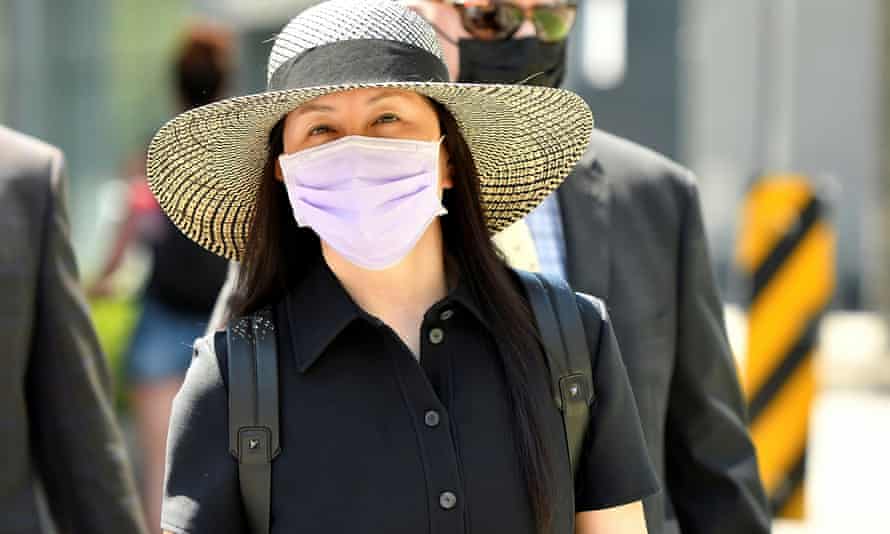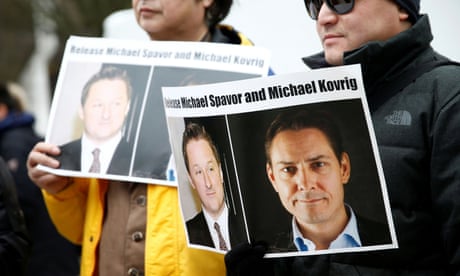Huawei lawyers claim emails prove US has no grounds to extradite CFO from Canada
Lawyers will try to persuade Canadian court to permit new documents to be introduced as evidence to clear Meng Wanzhou

The US justice department’s battle to extradite Meng Wanzhou from Canada has taken a fresh turn as lawyers for Huawei’s chief financial officer claimed that internal emails and bank documents prove there is no grounds to extradite her to the US.
Meng, 48, was arrested on a US warrant at Vancouver airport in late 2018, and has been battling extradition. Her detention infuriated the Chinese government and has helped drag relations between Beijing and Ottawa to their lowest point in years.
The US accuses Huawei of using a Hong Kong shell company called Skycom to sell equipment to Iran, in violation of US sanctions. It says Meng, 48, committed fraud by misleading HSBC about the company’s business dealings in Iran.
But Meng’s lawyers argue that documents from HSBC show that Huawei was open about its links to Skycom. In a statement, Huawei Canada said: “These documents consisting of emails and other HSBC records show there is no evidence of fraud on HSBC.
“They show that Huawei’s control over Skycom was not kept from senior HSBC executives, that the continuing nature of Skycom’s business with Huawei in Iran was not kept from HSBC executives and that internal HSBC risk assessments were made based on knowledge of the true facts.”
It added: “The reputational risks were managed with the knowledge of senior HSBC executives.”
Huawei lawyers will now try to persuade the Canadian court to permit the internal documents to be introduced as evidence.
Government lawyers in Canada are likely to contest Huawei’s interpretation of the documents and have argued that they are irrelevant to the extradition process and should be reserved for a fraud trial in the US.
Huawei has claimed that Meng’s arrest was prompted by the US as part of a trade war with China launched by Donald Trump.
Meng’s lawyers have been battling to gain access to the HSBC documents, first in a case in February in the UK that proved unsuccessful and then in March in Hong Kong, where it reached an out-of-court settlement with HSBC. The terms of the settlement was not published, but it appears HSBC gave Huawei access to the papers, with a confidentiality clause attached.
But last week the Canadian courts accepted an application from Canadian prosecutors and media groups that the information could not be kept under seal – an outcome that may not in reality have disappointed Huawei, since it made it more likely the evidence would be admissible in court to challenge the extradition claim.
US prosecutors allege Meng gave a PowerPoint presentation to HSBC in August 2013 that the US claims “involved untrue representations” by downplaying her firm’s control of Skycom, describing the firm simply as a business partner. The US says Huawei in reality controlled Skycom’s operations in Iran until at least 2014.
HSBC, according to the US government, “relied on those and other misrepresentations in deciding to continue the banking relationship with Huawei”.
HSBC “cleared more than $100m worth of transactions related to Skycom through the United States between 2010 and 2014”, says the US.
But Huawei argues the new documentation shows Meng did not mislead the bank, and so the basis for her extradition to the US is undermined.
HSBC had already given the internal documents to the US justice department in a bid to avoid prosecution by the US, but not to Meng’s lawyers.
The Chinese government has sharply criticised HSBC’s cooperation with the US government over the case.
HSBC has said it had no legal option but to cooperate with the US authorities. But the bank has been caught in a political quandary since it is headquartered in the UK and the bulk of its profits are made in China.
Meng has been living in one of her Vancouver homes on bail since her arrest at the city’s airport in December 2018. Days after Meng’s arrest, former Canadian diplomat Michael Kovrig and businessman Michael Spavor were arrested by the Chinese government on espionage charges. They remain in detention.

No comments:
Post a Comment
Comments always welcome!